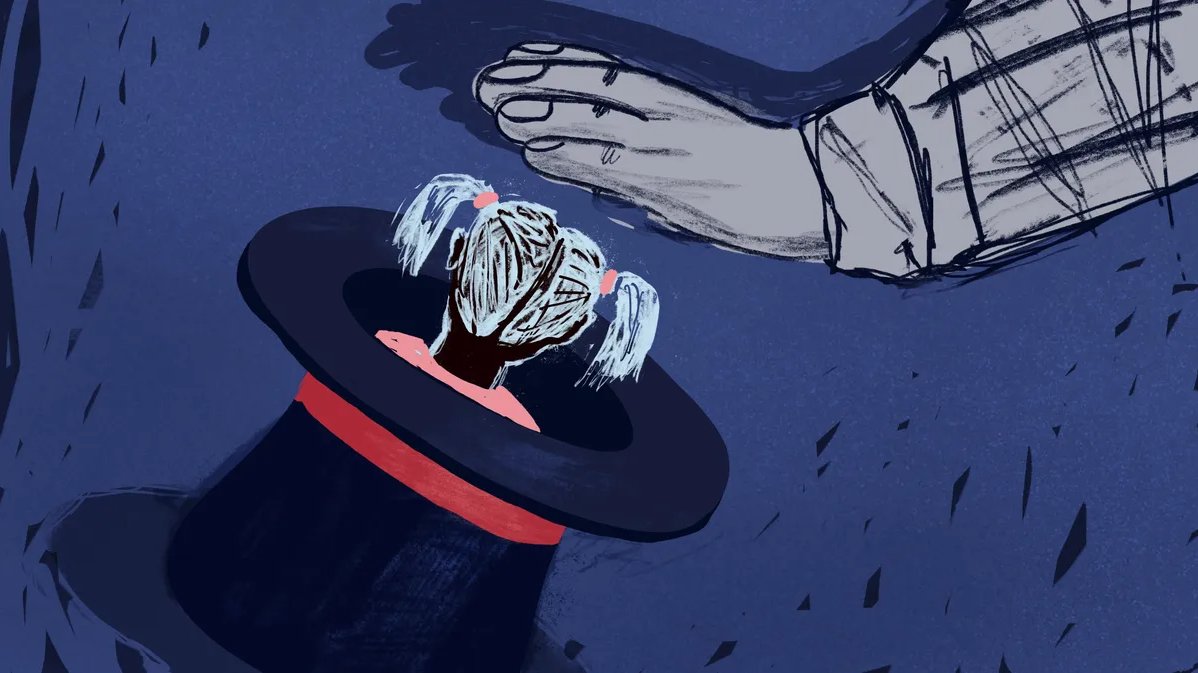As required by law, we have replaced the names of the underage girl and her parents featured in the story with fictional ones.
Alexander Zhukov, a 40-year-old graphic art designer from Moscow, called me a month after his father was taken into pretrial custody. He told me that Mikhail Zhukov, 68, a circus performer, was arrested on a count of child molestation on 3 October 2022, suspected of having sexually harassed his underage stepdaughter several years before.
“I understand that only my father and the girl know the whole truth about this story, and I can’t state for certain that he is absolutely innocent,” Alexander told me in a confused voice on the phone. “However, the more details I’ve been learning while studying the case files, the more I’ve been convinced that he might have been falsely accused. I am not asking you to take my words for granted, but I want to see a fair investigation. If he is guilty, prove it. Then I won’t support him and will even stop paying for his lawyer’s services. But if not, release him from jail.”
Deciding to act on his own to find out whether the charges brought against his father were substantiated, Alexander quickly realised that finding the truth in such cases is quite a challenging job even for impartial investigators. Sometimes this proves to be too hard a nut to crack even for world-class experts, let alone the Russian justice system.
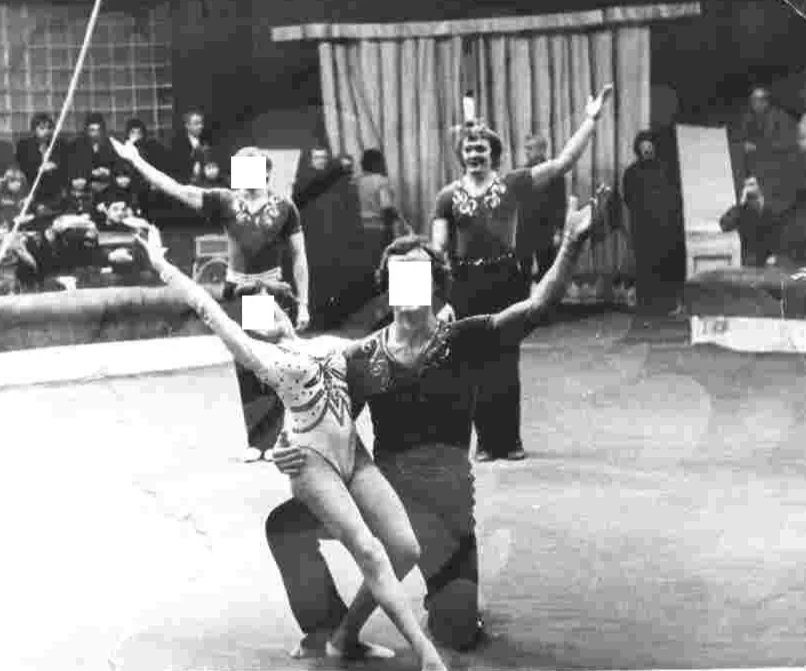
Mikhail Zhukov in the ring of the State Circus and Variety Art School, 1980. Photo contributed by Alexander Zhukov.
The circus princess
Alexander Zhukov believes he grew up in a loving and happy family, even though his parents divorced in the early 2000s, when he just turned 18.
His father, Mikhail Zhukov, worked all his life at a circus as a magician, an acrobat, and a pigeon trainer. He toured the world a lot before retiring in 1995. After that, he continued to perform as a self-employed magician at children’s entertainment events, specialising in tricks with birds.
In 2012, a family of circus performers, Igor and Valentina Gusevs, settled with their five-year-old daughter Alla in the same Moscow neighbourhood where Zhukov lived.
The Gusevs performed together in programs as balance masters, and friends visited them at home on weekends. The adults would play card games and talk about life, while Alla would draw in her room. Mikhail Zhukov and his son Alexander would occasionally be among the guests.
The Gusevs eventually began to quarrel, then Valentina filed for divorce in 2014, and the couple separated. Alla was seven at the time.
As it turned out later, during the investigation into the paedophilia case, Mikhail Zhukov had secretly fallen in love with Valentina Guseva virtually from the very moment they met each other. Although Mikhail was almost twice the age of a 32-year-old Valentina, he didn’t lose heart and, finally learning that she was unattached again, proposed that she and her daughter stay at one of his two apartments. He did not charge Valentina any rent. He would regularly bring his guests food, drink tea with them, and then leave.
Igor Gusev was tormented by his breakup with Valentina and apparently hoped to rejoin with her over time.
These all are important facts, as it was precisely Igor Gusev who filed a report on Zhukov with the police in 2022, claiming that he had molested his daughter.
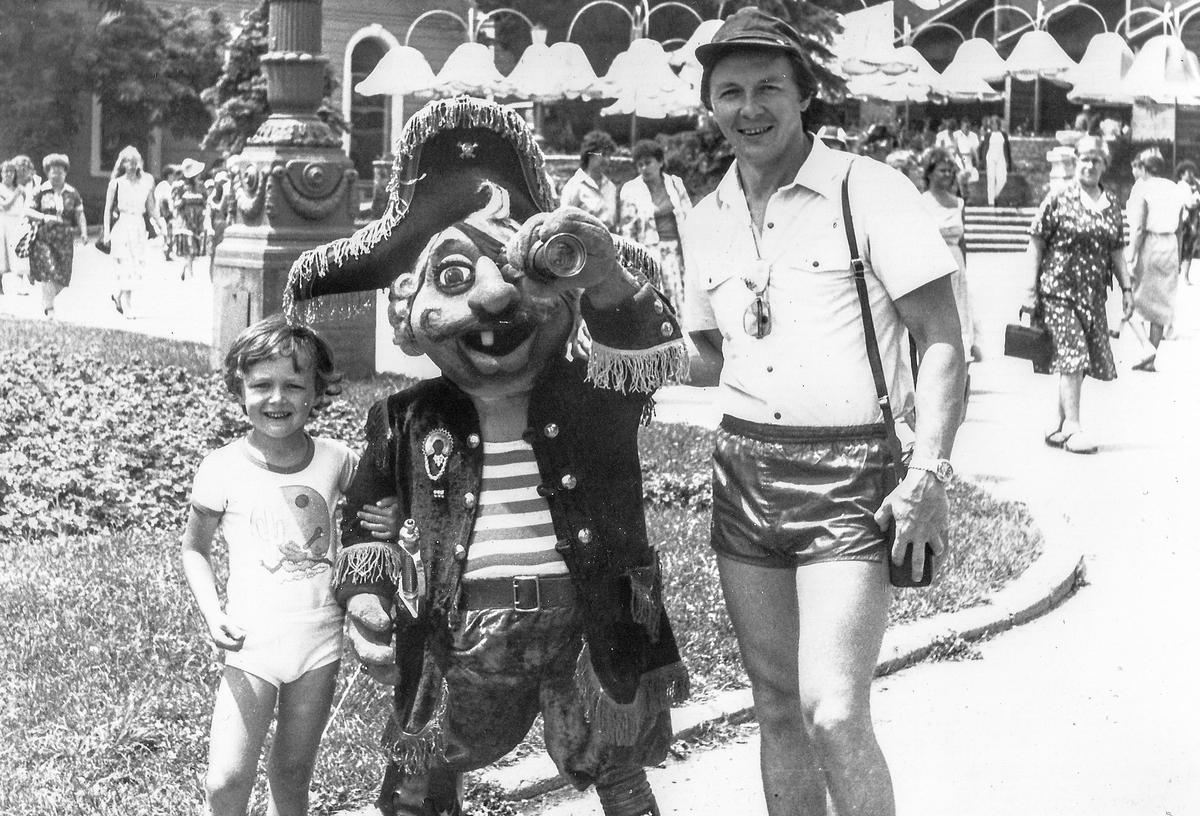
Mikhail Zhukov and his son Alexander in Yalta, 1989. Photo contributed by Alexander Zhukov
‘My girl’
Mikhail Zhukov and Valentina Guseva started living together in 2015. They married in 2018 and began to stage magic shows with birds, Mikhail as the entertainer and Valentina as his assistant.
Mikhail Zhukov’s friends told me about his tender passion toward his young wife. As for Alexander, he thought Valentina did not really reciprocate his father’s feelings.
After Valentina and Mikhail moved in together, Alla would live alternately two weeks at her father’s home and two weeks with her mother and stepfather. Alexander Zhukov was always aware that Mikhail had strained relations with his stepdaughter. She clashed fiercely with him from day one, which Alexander often witnessed himself.
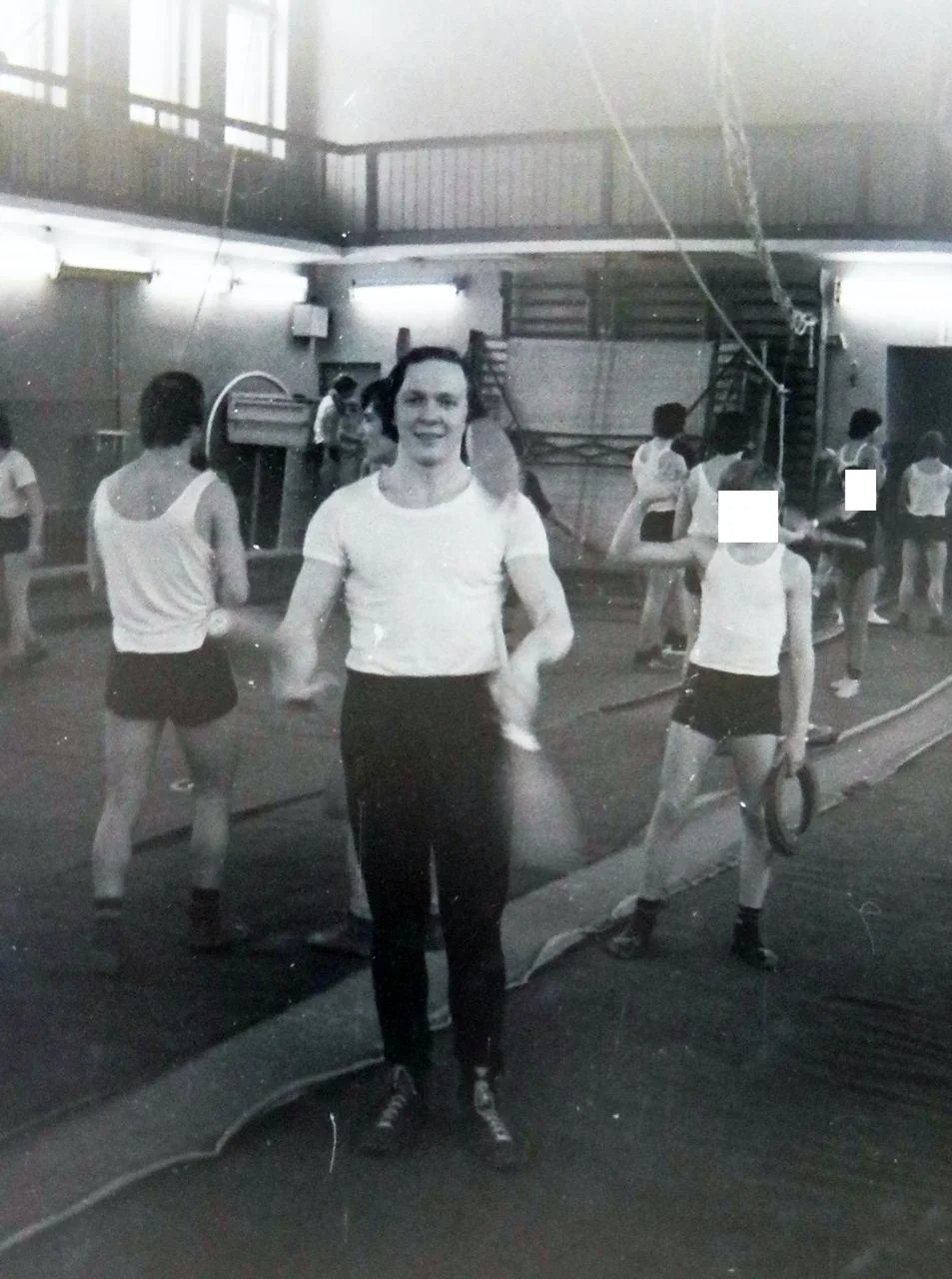
Mikhail Zhukov practicing at the State Circus and Variety Art School, 1980. Photo contributed by Alexander Zhukov
For instance, when Mikhail asked her to wash her hands before having dinner, Alla might reply, “You’re not my father!” Or even something like, “I wouldn’t sit at the same table with him!”
But what really perplexed Alexander is his father’s reaction — Mikhail was quite lenient to his stepdaughter’s escapades, “because he really loved Valentina and understood that if his wife saw that he could not get along with her daughter, she would leave him.”
Mikhail referred to Alla as ‘my girl’, but, as Alexander says, he never really sought to be treated like a real parent. In fact, he only helped his wife when she was pressed for time, drove Alla to school, and so on.
“I did not help her with her homework and did not take her out for walks. I would only teach her some household chores,” Mikhail Zhukov himself said while questioned in 2022.
He tried not to meddle in his stepdaughter’s upbringing and in decision-making related to that.
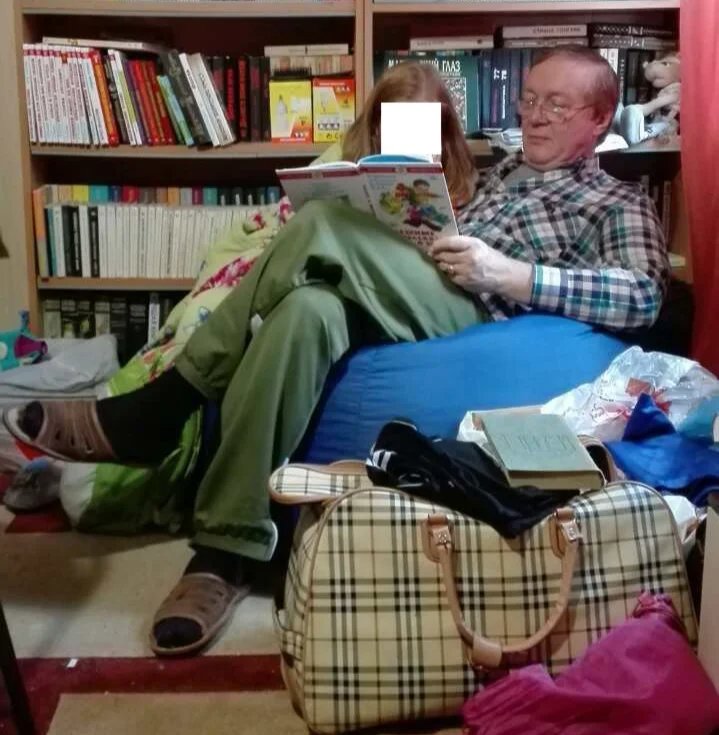
Mikhail Zhukov with his stepdaughter Alla, 2015. Photo contributed by Alexander Zhukov
Spot the difference
In January 2021, Igor Gusev came to the police together with his 13-year-old daughter to file a report claiming that, from 2015 to 2018 (that is, when Alla was eight to eleven), Mikhail compelled her to watch soft porn together and masturbated in her presence. In addition, Gusev claimed that Mikhail would regularly put Alla in his lap and, while she was playing computer games, would touch her under her clothes. And then he threatened that if she told her mother about that, he wouldn’t let her play computer games.
No criminal investigation was started at the time. The investigator conducted a preliminary inquiry for about 18 months and, having studied all the files, concluded that there was no criminal event.
Valentina and Igor Gusevs declined to talk to me. However, I examined the 2021 resolution dismissing Igor Gusev’s petition to open a criminal case. It sets out testimony given by Alla’s parents, Mikhail Zhukov, and some other people who knew what happened at their home.
Valentina’s friend, Klavdia Zyazina, told the investigator that, back in summer 2020, Alla confided to her that she held a grudge against her stepfather. Moreover, Alla even said at some point that she hated Mikhail Zhukov because he was “a problem” in her relationship with her mother and “the reason behind Mom’s and Dad’s divorce.” Zyazina tried to explain to the girl that her parents divorced not because of Zhukov, but Alla “flatly refused to accept that”. And then she uttered in passing, “You don’t even know what he showed me…”
Zyazina started inquiring the girl what exactly her stepfather showed her, but Alla “didn’t answer anything in particular, turned her eyes away, and smiled”. Klavdia asked Alla whether Mikhail touched her “in the genital area”, to which the girl responded “categorically”: “No, that didn’t happen for sure.”
Zyazina also informed the investigator she had learned from Valentina at the end of December 2020 that Alla had also told her that the stepfather “showed her something and spoke to her about something.” And yet, despite the mother’s pressure, the girl didn’t share any details with her.
Anyway, as Zyazina said referring to her friend, Valentina “threw a fit with Zhukov” the same day, but he insisted that he had never molested her daughter. The couple quarrelled, and Zhukov left to ring in the New Year with his mother, but then he came back on 1 January, and Valentina and he made up.
Just a few days later, on 7 January, Alla came to her father and stepmother and told them that Zhukov had touched her “genital area” from when she was seven years old. This prompted Igor Gusev to take her to the police.
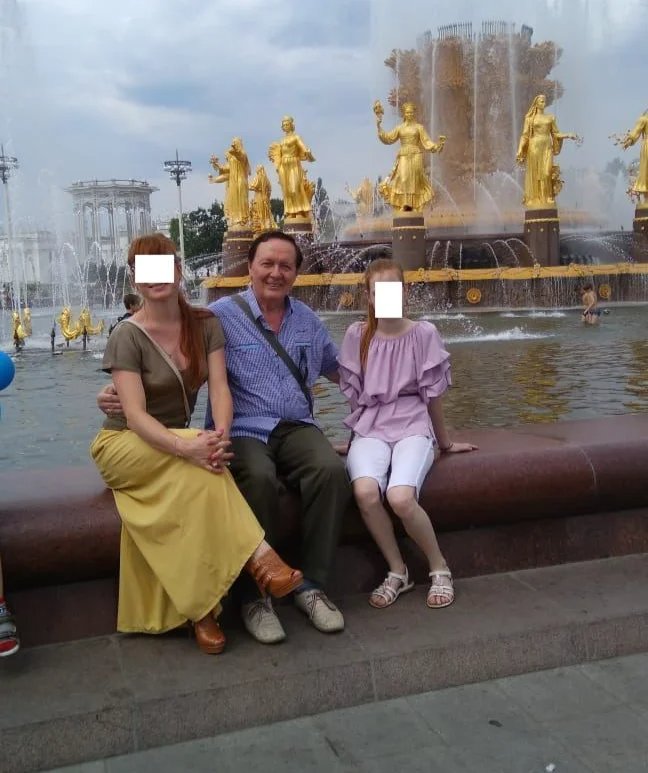
Mikhail Zhukov with his former wife Valentina Guseva and stepdaughter Alla, 2019. Photo contributed by Alexander Zhukov
It is noteworthy that Valentina herself assured the investigator that her daughter had never told her about her stepfather’s harassment. According to the mother, Alla was “violently hostile” toward Mikhail Zhukov, “especially when he asked her to do some household chores”, “didn’t want him to live together with us”, and constantly blamed him for her parents’ divorce.
After Igor Gusev reported Zhukov to the police, Alla stayed with her father and never returned to the home where her mother and stepfather lived. Several days after Igor and Alla visited the police, Valentina invited her daughter to meet up and talk. Their conversation took place in Valentina’s car shortly afterwards.
The mother asked the girl whether “Mikhail raped her or touched her genital area”, to which “Alla replied categorically that no, Mikhail Zhukov didn’t do that to her” but that he still “must be punished” because he is “a maniac”.
The girl supposedly explained to her mother that she regarded her stepfather as a maniac because she had found posters of topless women under his bed and a figurine of a naked woman on a shelf in his room. (According to Alexander Zhukov, his father brought this figurine of a nude African woman as a souvenir from his tour to Tunisia back in the 1990s.) Asked by her mother whether Mikhail showed her those posters himself, Alla supposedly answered in the negative.
As Valentina told the investigator in 2021, having discussed everything with her, Alla “understood that Zhukov did not apply violence to her” and asked “what can be done now to make sure he is not put in jail”.
On 15 January, or just a week after Igor Gusev filed the report, his daughter Alla passed on her explanation written out by hand to police via her mother (Novaya Europe has its copy). In her statement, Alla acknowledged that she had “exaggerated” everything very much, as she believed Mikhail was to blame for her parents’ divorce.
As followed from her statement, her stepfather did not coerced her into watching porn together with him, but she just accidentally caught him watching it while walking by his room.
“He noticed me and switched it off, and I asked him what it was,” Alla said in her statement. “He started explaining it to me at my young age. Of course, I didn’t understand anything and was just listening.”
Now the girl wrote, “I did play [computer games] in his lap, but he didn’t touch me!!! And when we were cleaning the room, he didn’t undress me!!! I’m sorry for making some stuff up. After I was told that an innocent person would be put in jail, I felt bad. And I decided to admit that most of what I said is not true!!! I’m sorry. After all, none of us is ideal.”
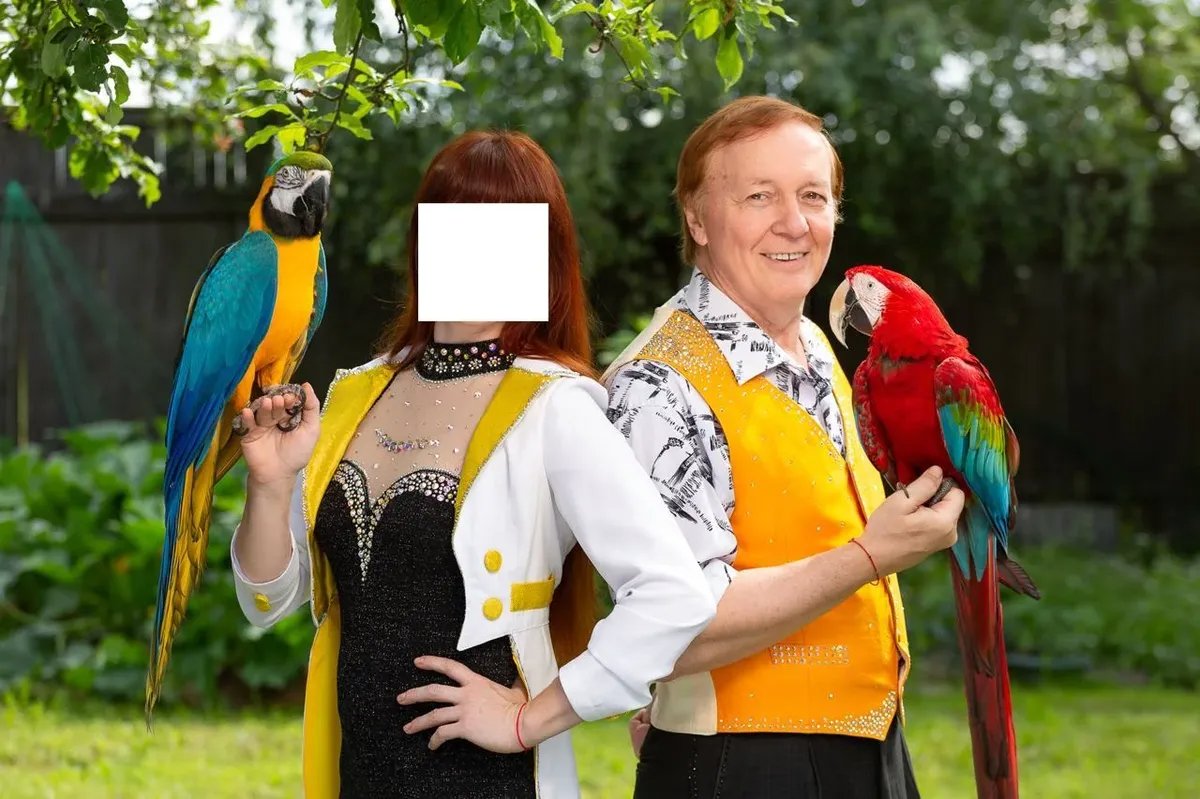
Mikhail Zhukov with his ex-wife Valentina Guseva at their country home, 2019. Photo contributed by Alexander Zhukov
‘Smiley, positive, calm’
Despite the girl’s explanations, the preliminary inquiry continued. As part of that procedure, Alla was subjected to psychological and psychiatric tests, during which she no longer stuck to the theory that she set out in her explanatory statement.
The experts indicated that she was “notably more emotional” when the conversations concerned Zhukov. “With a positive expression on her face, smiling from time to time, loudly and confidently, often without a second thought, and using the same phrases, she quickly related information dating back to the time when she was five years old or recalled the dates and days of week of events that happened three years before.” She said that she “always disliked” Mikhail, because, as her father had told her, “that Misha [short for Mikhail] guy ruined their family and it’s because of him that Mum left”, and thus she believed that “Misha must be punished”.
At the same time, experts recorded that, when asked clarifying questions, she would utter a lot of conflicting statements.
Alla told psychologists that she had known Mikhail since she was five, when he visited her parents at their home. She said she “realised immediately when she saw him the first time that he liked her”. Mikhail Zhukov paid her compliments and supposedly told her, “What beautiful hair and eyes you have, how slender you are, you have a nice figure.” Asked by the psychologist, “Did he use exactly those words?” Alla replied, “Not exactly. He said, ‘You look like your Mum and Dad.’”
Asked how exactly Mikhail Zhukov “fondled her breasts” in 2017, that is, when she was ten, the girl replied that he “squeezed my breasts.” Moreover, she said she even remembered the succession in which he touched her breasts.
Experts also pointed out a serious chronological inconsistency in the girl’s account: in her initial statement, Igor Gusev claimed based on his daughter’s words that the stepfather had molested her all her elementary school years, that is, from 2015 to 2018. However, during the expert examination, she spoke only about 2017.
Alla insisted that she felt well and had not noticed any changes in her mental state after what happened. The experts concluded that she is “smiley, positive, calm, and relaxed”.
“Inflated self-esteem, self-confidence, and the desire to be the centre of attention are noticeable. For example, she says that she is ‘the best’,” a psychologist said in describing Alla. “Tends to behave in a demonstrative and egocentric manner, is likely to feel offended.”
And yet despite numerous inconsistencies, the members of the expert panel concluded that Alla’s initial testimony was “quite credible in general”.
“The analysis did not reveal clear motives for false testimony. Tests for increased susceptibility to suggestion proved negative. No inclination to pathological fantasising has been revealed,” the commission concluded. That said, the experts ignored the explanation in which the girl in fact admitted to having falsely accused Mikhail.
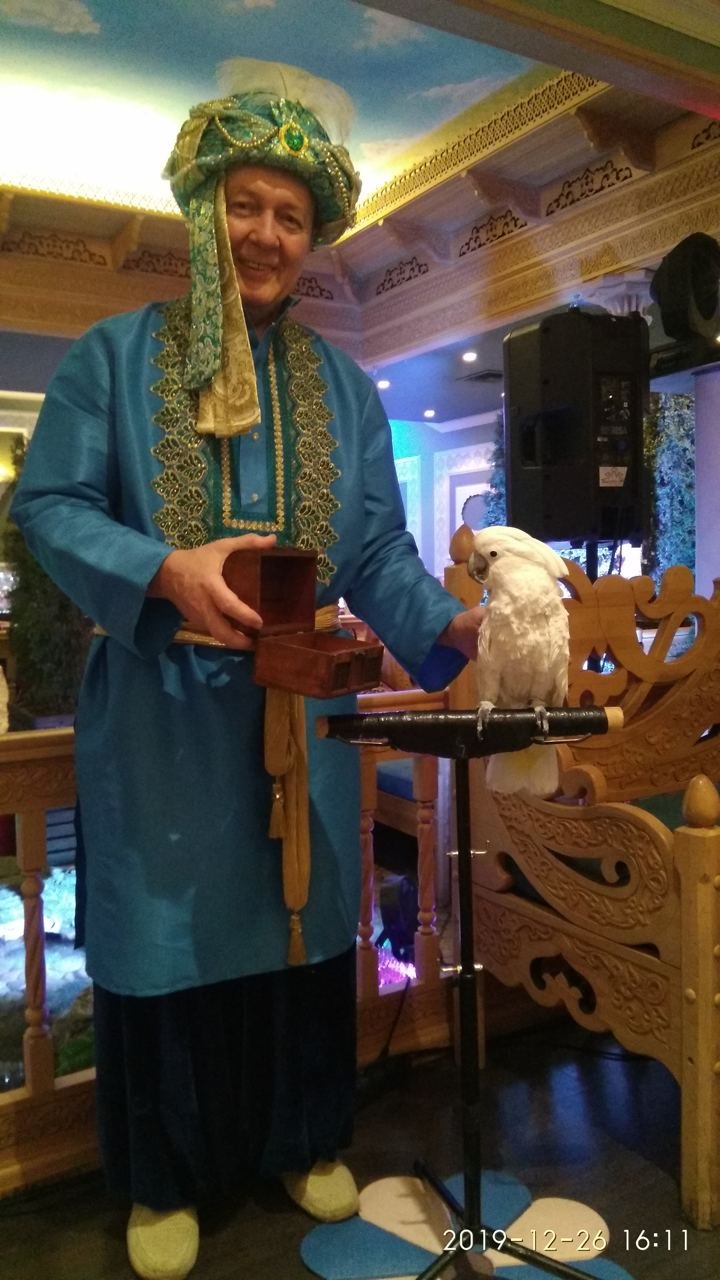
Mikhail Zhukov in a welcome zone with a fortune-telling parrot before a performance. Moscow, 2019. Photo contributed by Alexander Zhukov
Housing problem
After Igor Gusev filed a report on Zhukov and Alla moved to his home in January 2021, Valentina Guseva lived together with her husband for at least another half a year. We know what happened over this period of time and afterwards mainly from Mikhail’s online chats and recordings of his phone calls.
Alexander Zhukov gained access to them after his father’s arrest, when the investigator simply returned the phone to him. This is when Alexander found out that it had the automatic cloud call recording function activated over the previous couple of years. He cracked the password and found the cloud-stored recordings of his father’s conversations with Valentina and Alla. Alexander read all of his father’s online chats with his friends and colleagues and listened to the recordings of his conversations with Alla starting from 2017, which is when, according to the girl, Mikhail began molesting her. Alexander also studied Mikhail’s communications with Valentina from 2021 in order to see whether she believed her daughter’s accusations and find out how her relationships with Mikhail developed after that.
Alexander forwarded those audio recordings to me. They were numbered automatically, which suggests the conclusion that Zhukov sent me all of them, without skipping “inconvenient” ones.
All the conversations between Mikhail Zhukov and Alla that I have heard, which is 82 audio recordings, dealt with various routine requests on her part (i.e. bringing to school an exercise book she left home or candy to a summer camp, driving her from school to a sports club, helping convince her mom to allow her to stay overnight at her friends’ home, etc.). I haven’t found a single recording hinting at any special relations between them.
Alexander Zhukov concluded that Valentina didn’t believe that Mikhail harassed her daughter. This is evident, among other things, from audio recordings of their conversations,
in which they speak to each other in a friendly manner and discuss routine things, like what food to buy, already after Alla had levelled all of her accusations at Mikhail.
There was a rift between the spouses in summer 2021. As follows from a WhatsApp voice message that Mikhail sent to his friend (Novaya-Europe has its copy), he learned that Valentina had been unfaithful to him. They divorced in February 2022.
Having read his father’s chats with Valentina, Alexander learned that, following their divorce, she insisted that Mikhail let her and her new boyfriend live in the family home outside Moscow, where Mikhail himself was living at the time, as they had nowhere else to live. However, the former husband disagreed.
This house has quite an interesting history.
Mikhail and Valentina bought it for 11 million rubles in 2019, shortly after their marriage.
When the former spouses started discussing the division of property following the divorce, Valentina insisted on selling the house: in her view, its value had significantly increased over the previous three years, and now it could be sold at 35 million rubles. Mikhail proposed that, instead of her share in that property, Valentina take possession of another house in a Moscow suburb that belonged to him, which cost about 9 million rubles. However, she disagreed and demanded an extra payment in cash, which, as Alexander said, “Dad had nowhere to get.”
Support independent journalism
All independent media have been banned in Russia which makes our work not only challenging but outright dangerous. We need your support.
Valentina wrote to Mikhail in September 2022 (Novaya-Europe has a screenshot of the message): “You perfectly understand that there are ways to do this without your consent!”
Zhukov was arrested ten days later.

Mikhail Gusev with his former wife, 2019. Photo contributed by Alexander Zhukov
Blacklist
Police arrived at Mikhail Zhukov’s home on the afternoon of 3 October 2022.
The day before, Igor Gusev filed another report accusing Zhukov with the Investigative Committee. In the previous statement, Gusev claimed that Zhukov harassed his daughter from 2015 to 2018 every time Valentina was not at home. Now he said Zhukov committed the same crimes “within an unspecified period” between 2017 and 2019, and did this “at least twice every week,” except for the summer months when Alla stayed with her father.
For investigator Kristina Bulygina, to whom Igor Gusev’s new report was referred in early October 2022, this information was enough to immediately initiate Mikhail Zhukov’s arrest and have him taken into pretrial custody.
Kristina Bulygina apparently had a time-tested method of conducting such investigations. At least Alexander told me that she immediately recommended not wasting money on Moscow lawyers but better hiring attorneys she knew, “who know local judges and who would cost you less”. And when Alexander still hired different counsels, Bulygina, in his words, warned him that, by “standing in her way”, he would only make things worse for his father. “No matter what you do, he’ll be put in jail anyway,” she supposedly said.
Immediately after his father’s arrest, Alexander had to move to his home outside of Moscow. The investigator searched Mikhail’s house only a month and a half after his arrest, and thus Alexander had an opportunity to “comb through” all of his father’s gadgets and other belongings and try to find out at least something.
Looking for an answer to the question as to whether his father was guilty or not, Alexander scrutinised all of Alla’s school exercise books and notepads and even read her school essays. Examining the girl’s room on the upper floor of the two-story house,
he found a diary that she started in March 2019, when she was 11. That is, after Mikhail Zhukov had supposedly molested her.
This diary has been attached to the criminal case files, and Novaya-Europe has its copy.
The very first entry in Alla’s diary is titled ‘My Enemy’ written in the middle of a page. And the entry itself says, “Misha and Mom are quarrelling today. Misha says he is always right. Hate him.”
“Will be put on the blacklist,” she added with a pink marker pen.
She mentioned her stepfather only once, on that very first page where he is referred to as an enemy. In all of the other entries, the girl writes about absolutely different people and events.
The search
A month later, which Zhukov spent at a detention centre, investigator Bulygina told his son that she finally decided to examine Mikhail’s home. After Mikhail’s lawyer, Alexei Bychko, said he wished to be present during the procedure, the investigator called Alexander and, according to him, shouted at him, threatening that she would “take everything away from his home” and would even come to his girlfriend’s and his mother’s home for a search if the lawyer arrived and “meddled with her investigative actions”.
Alexander Zhukov filed complaints with the prosecutor’s office and the Investigative Committee, attaching the recordings and transcripts of his conversation with Bulygina. No sanctions on the investigator followed.
I tried to reach out to Bulygina to ask her whether it was true that she threatened Alexander. The investigator didn’t answer, even though she saw my message.
And yet a lawyer was present during the search at the home. Lawyer Chegodaikin, whom Zhukov hired to protect his interests, told me how the search was conducted. In his words, having searched the home, Bulygina triumphantly seized memory cards, condoms, a lubricant, petroleum jelly, baby cream, a remote control from an old vibrator, the souvenir figurine of an African woman he’d brought home from his Tunisia tour, and a video camera. From a large box with videotapes, she took away two with erotic films dating back to the 1990s.
‘Caused psychological damage’
In November 2022, when Alla was 15, she again underwent a psychological-psychiatric examination.
Alla told specialists from the expert commission that she had retracted her charges against her stepfather in 2021 because her mother “didn’t believe me, talked me into taking my motion back, said that it was untrue and that she [the mother] would be left homeless, my stepfather would be put in jail, and they’d have a file on me [as a false accuser].” However, Alla decided later that Zhukov “must pay a fine to the state” because his actions in relation to her “caused psychological damage”.
Mikhail Zhukov is currently held at a detention facility in Volokolamsk outside of Moscow, sharing a cell with five other inmates. He complained to the doctors who examined him about having some heart issues. Alexander Zhukov, who visited his father, says that he lost a lot of weight and looks haggard and depressed.
Fifty-fifty
Looking into details of this story, I often caught myself thinking that, while the supposed crime related by the girl didn’t have witnesses, or physical traces, or testimony by other victims, routine details from her family’s life do not make things clearer, either. Moreover, virtually any of those details may be equally interpreted either as evidence indirectly proving Mikhail’s guilt or an argument in favour of his innocence. For instance, did the stepfather grant all of his stepdaughter’s wishes so obediently because he really wanted to please her mother or because he felt guilty for something bad he had done to the girl?
I have neither qualifications nor the right to make conclusions as to whether Mikhail Zhukov is guilty or not. It is for a court to decide. However, I wonder how such cases should be investigated in an ideal situation. How can you get to the truth where all you actually have is one person’s word against another’s? And can the truth be established in principle?
One of the few ways to find a man guilty of a sex crime against a child in Russia is through diagnosing him with paedophilia.
At the end of November 2022, Alexander Zhukov learned that his father underwent a psychological-psychiatric examination, in which the panel concluded that he had heterosexual paedophilia.
I obtained that assessment report and forwarded it to Yevgenia Smolenskaya, a clinical psychologist and sexologist, asking her to share her comments with me. Smolenskaya collaborates with the Russian psychotherapeutic clinic Mental Health Centre using an evidence-based approach in its work.
Smolenskaya earned her master’s degree in Forensic Mental Health Counselling from the City University of New York (CUNY) in 2021.
“Only half of those who commit sex crimes against children are paedophiles in a clinical sense,” Smolenskaya says. “Many of them do immoral things with children just because they were available to them. For instance, a person having an antisocial way of thinking experienced a sexual desire when a child was nearby.”
At the same time, numerous “clinical paedophiles” do not commit crimes, Smolenskaya says.
She pointed out to me that the experts who assessed Zhukov diagnosed him with paedophilia based not on some studies but on the filings of his criminal case, that is, actually based on the girl’s words. The document contains the following phrase: “The commission concludes that Mikhail Zhukov has heterosexual paedophilia, which is evident from the criminal case filings regarding abnormal activities he was engaged in.”
That is, even before the investigation has been completed and a court has handed down its judgement, the experts concluded that Mikhail is guilty, and therefore, he is a paedophile. This might take an absurd turn, for if the trial, for instance, proves that Zhukov did not commit a crime, his diagnosis will also have to be scrapped.
In Russia, a panel of specialists tasked with finding out whether a person has such a disorder of sexual preference as paedophilia usually includes a psychologist, a psychiatrist, a neurologist, and a sexologist. Each of them assesses the subject from their perspective, and in the end, based on all data collected, they decide what they are dealing with.
In Zhukov’s case, doctors examined him and did not discover any pathology in his physical, mental, neurological, or sexual health, Yevgenia Smolenskaya says.
She explained that, in general, paedophilia is a deviation that is very hard to diagnose. Therefore, American researchers have been exploring more accurate instruments to detect this disorder.
Experts often offer people a questionnaire: it is believed that, when they have to answer in person, especially if asked questions with accusatory connotations, they will be less likely to give honest answers, but if they are left one-on-one with a form, this might prompt them to be more sincere.
Specialists in the US also use instrumental survey methods, such as behavioural observation or the measurement of viewing time.
“A subject is shown various pictures of men, women, children, and neutral stimuli and is asked to remember details, as they would supposedly have to answer some questions afterwards,” Smolenskaya says. “In reality, the experimenter cares only about how long it takes the subject to watch this picture or another. A person cannot control this time unless they know the real objective of the experiment. People who have paedophilic preferences involuntary devote more time to children-related content.”
This method is widely criticised on the grounds that a person might learn the experiment’s real objective in advance, and in this case, it would be quite easy to falsify the findings.
Another common method used by experts is phallometry. Although it can also yield a false result, it is much harder to deceive. Briefly speaking, it consists in measuring blood flow to assess the level of a person’s sexual arousal in response to various stimuli, like children’s photos or audio recordings of their voices.
Spontaneous brain activity is something a person is able to control least of all, and therefore, specialists have lately started using MRI to diagnose paedophilia. In Smolenskaya’s words, while there have been not that many studies yet, this method is “considered unofficial but promising”.
During our conversation, the doctor insists repeatedly that none of these methods “can even remotely be seen as a hundred percent guarantee that the right diagnosis will be made”.
For that reason, “specialists in the West collect a lot of various information together. They speak to the suspect and the victim, as well the suspect’s acquaintances, because, if someone is a genuine paedophile, it’s unlikely that there was just one incident, and he might have behaved strangely in the past, which other people might have noticed. As a rule, this disorder destructively affects a person’s life, and therefore, experts check whether the suspect has a history of run-ins with the law, as well as problems at work and in family relationships.”
“Then the investigators aggregate all this information and forward it to a court, where prosecutors debate it with defence attorneys and the jury to decide whether the expert findings are in favour or against the defendant,” Smolenskaya says.
None of what is listed in the psychological-psychiatric findings concerning Zhukov has any relation to these data collection methods, which work at least partially, Smolenskaya says.
The methods that were used by Russian experts “are absolutely unrelated to the diagnostics of paedophilia, those were just standard psychological and neurological assessment tests, which could have been applied, for instance, to you if you ended up in a hospital with some disorder,” she says.
The doctor focuses my attention on the fact that we cannot know for sure whether Zhukov committed a crime.
“It’s a fifty-fifty situation. Maybe yes, maybe no. But they make a diagnosis, while no grounds for it were revealed during that assessment, from the standpoint of clinical behaviour,” she says.
A child cannot tell a lie
In fact, Alla’s testimony is the only evidence of Mikhail Zhukov’s guilt at present. But can children’s testimony really be trusted? Especially testimony given by children in a stressful situation?
In the US, this is still a subject of very heated debate, Yevgenia Smolenskaya says. Some experts there are sure that children cannot be viewed as reliable sources of information, as they are highly impressionable and can easily be influenced, even when adults do not actually try to influence them (American studies qualify children as persons 4 to 9 years of age).
Other experts argue that, on the contrary, children’s testimony can be treated as highly reliable, as they are not that skilful at cheating, their way of thinking is simpler, and therefore, even if they try to tell a lie, it is easy to recognise it and understand their motives.
Both camps agree that children can provide essential information, but it takes special training to correctly obtain it from them. The US National Institute of Child Health and Human Development (NICHD) has even developed a special interview guide describing how children should be questioned, and law enforcement officials get trained to use it in their work.
In Russia, there are no special protocols for working with children. Lawyer Alexander Gofstein says that sex crime cases are among the most difficult ones for defence lawyers, “because, if a child says something, they are believed”.
“A small child is believed even more,” Gofstein says. “Because it’s a common perception that they can’t lie. Indeed, a child’s testimony is often enough to arrest a suspect, even if this testimony is not always consistent and contradicts other evidence,” he says.
“The law qualifies persons under 12 as ‘helpless’: it’s considered that they don’t know how to tell a lie until that age,” says lawyer Valery Angelov, who has defended men charged with child molestation in court. “But can a child actually make anything up? Yes, they can. How can this be proven and how can their words be disproved? If the investigator isn’t inclined to make sense of it, there’s no way to do it. A child’s words are given priority in our law enforcement system.”
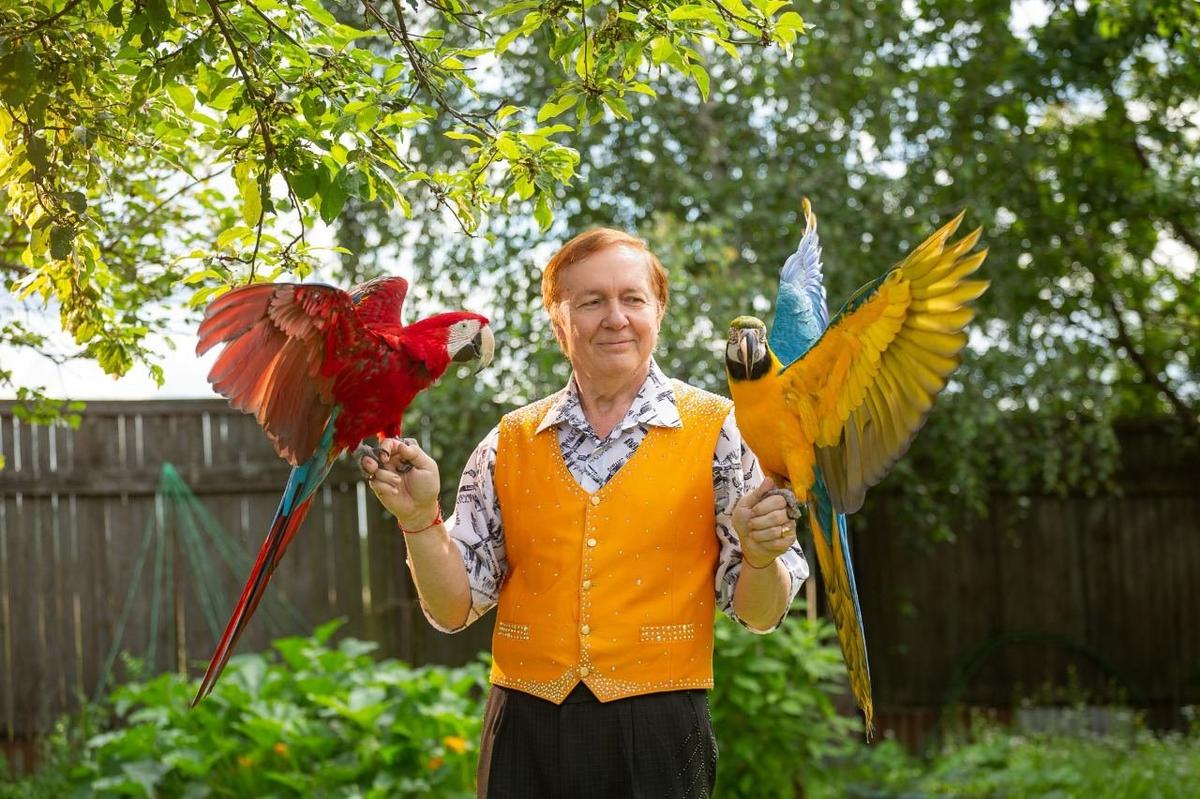
Mikhail Zhukov at his country home, 2019. Photo contributed by Alexander Zhukov
Human rights defender Mary Davtyan, however, disagrees and says that he has encountered a diametrically opposed problem, that is, law enforcement officers’ mistrust in children’s accounts. “It’s untrue that, if only a child claims that a man touched him, then the latter will certainly go to jail,” Davtyan says, adding that far from all reports of violence against a child reach court.
Psychologist Yevgenia Smolenskaya believes such cases are very complicated precisely because there is a lot of room for “a human factor” in them.
Apart from that, says lawyer Valery Angelov, “these cases often have some backdrop, like a scandalous divorce of a child’s parents, property division, the child’s grudge against an adult, or other motives for revenge”. As this category of cases is considered “disreputable” enough for many lawyers to refuse to take them up, and journalists are afraid of writing about them, this provides huge opportunities for some people to resort to “paedophilic” charges in pursuing some venal interests.
Lawyers who do take up such cases often deal with the absence of undeniable proof, and in that instance, they have nothing to do but try to find indirect evidence. In Russia, the findings of a psychological-psychiatric assessment of a victim are listed among such indirect evidence. However, psychologists themselves say they cannot, and actually should not, determine whether there was a crime. The investigation only tasks them with determining the victim’s state and condition.
What is more, Yevgenia Smolenskaya doubts that psychologists’ findings can be used as evidence of anything at all, because a child who has been subjected to sexualised violence may not demonstrate any specific behaviour several years later.
And even though some disorders are typical for children who suffered from violence, like, for instance, complex post-traumatic stress disorder or borderline personality disorder, they might be unrelated to sexual violence, she says.
That said, Smolenskaya admits that a psychological-psychiatric assessment of a child who has suffered from abuse “can theoretically be useful”, as it helps to learn slightly more, after all.
“But if desired, these findings can be used either way to substantiate anything,” she says.
Before 2013, cases involving “paedophilic charges” were heard by a jury in Russia, and they were also investigated by officials of a higher level. However, these cases were disqualified as those that merit a jury trial in 2013. Since then, acquittals in such proceedings have been granted even more seldom than before.
As defence lawyers admit, the outcome of a suspected paedophile’s trial these days depends almost solely not on real evidence proving the defendant’s guilt but on the judge’s predisposition.
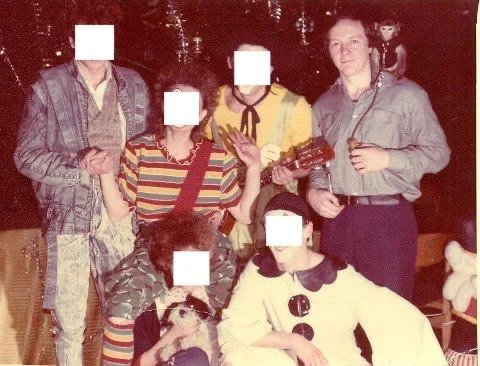
Mikhail Zhukov with colleagues after a circus show. Moscow, 1988. Photo contributed by Alexander Zhukov
When the ‘victim’ stands up in defence
Investigations into such crimes are a problem for all countries, as they are considered “highly latent”. And though, for instance, the US has developed special methods and standards of such investigations, even there, numerous people are convicted of such crimes groundlessly.
There are even organisations in the US specialising, among other things, in contesting prison sentences and getting people wrongfully convicted of paedophilia out of jail.
As follows from the US National Registry of Exonerations, over 200 people in the US have been freed from prison since 1989 after being cleared of committing sex crimes against children. This often happened after a child, who was a member of the convicted person’s family, waived their allegations after growing up. In some instances, children even acted as public defenders of the people they once accused.
Everything is different in Russia. Lawyer Valery Angelov observed a paradox: from his experience, when a child reveals a crime supposedly committed against them, their words usually carry a lot of weight with the investigation and are believed, in his experience. However, “when a child later admits that they made everything up or exaggerated, law enforcement agencies and the justice system say that the child’s testimony cannot be trusted, as they might have been pressured by their parents to make things easier for the wrongdoer.”
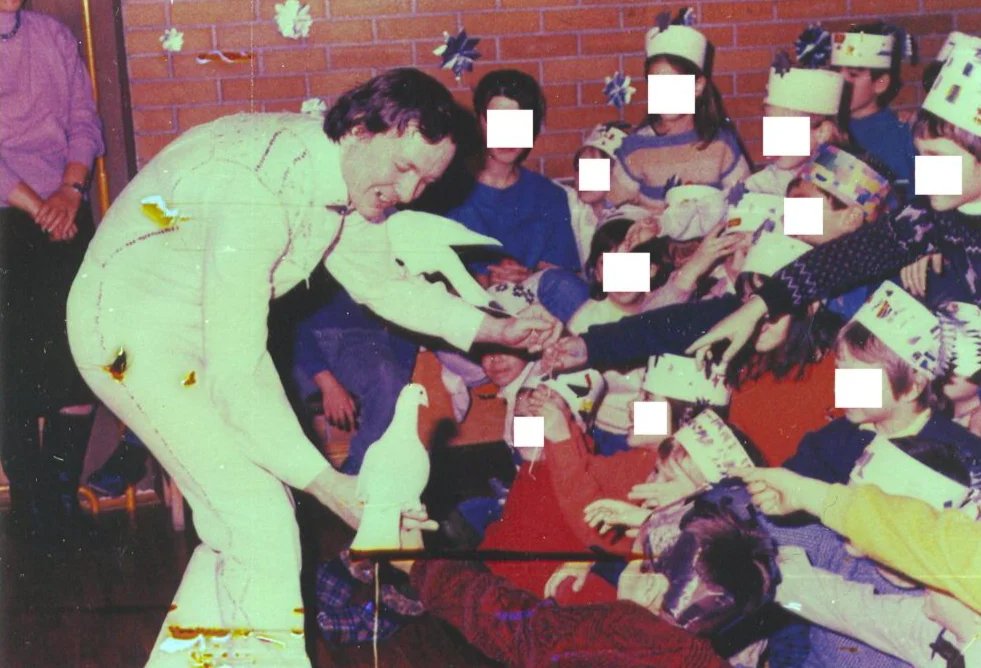
Mikhail Zhukov during a Yugoslavia tour, 1991. Photo contributed by Alexander Zhukov
When it’s time to raise the alarm
Experts who have ever been involved in investigating sex crimes against children share the opinion that they are extremely hard to investigate. Sometimes even impossible. But what has to be done then? Such crimes should be pre-empted through sex education.
“Children must be taught that there are body areas which neither grandmothers, nor grandfathers, nor even moms and dads can touch without a reason. So that children could raise the alarm early enough,” Yevgenia Smolenskaya says.
Experts are confident that it is important also to provide sex education among adults, because they often commit these crimes not because they are paedophiles, but because they think there is nothing wrong with fondling “those parts” of a child.
“This is a dysfunctional system of beliefs,” Smolenskaya says. “After all, some think they do not rape a child but accustom them to the world of sex. ‘Oh, come on, I am not a paedophile, she is 14, this is not a problem.’ They think they wouldn’t do a child any harm; moreover, a child could even get sexually aroused from what they do to them. Such people must be made aware that this cannot be interpreted as consent, that this still constitutes violence, and that this would have an impact on the child’s mental health. Many people still have big problems with someone else’s personal boundaries, they simply ignore them. And whether an adult is a clinical paedophile or not is absolutely irrelevant.”
The investigation into Mikhail Zhukov’s case is nearing completion, and it should be forwarded to the Prosecutor General’s Office soon. His son Alexander Zhukov keeps on trying to make sure that his father’s case is referred to the central office of the Investigative Committee in the hope that they would certainly conduct a thorough investigation. He has no doubt that, if Mikhail is convicted and imprisoned, this would be akin to a death sentence for him.
And as I’ve been preparing this text, I no longer have any doubt that Mikhail will certainly be convicted.
Join us in rebuilding Novaya Gazeta Europe
The Russian government has banned independent media. We were forced to leave our country in order to keep doing our job, telling our readers about what is going on Russia, Ukraine and Europe.
We will continue fighting against warfare and dictatorship. We believe that freedom of speech is the most efficient antidote against tyranny. Support us financially to help us fight for peace and freedom.
By clicking the Support button, you agree to the processing of your personal data.
To cancel a regular donation, please write to [email protected]
